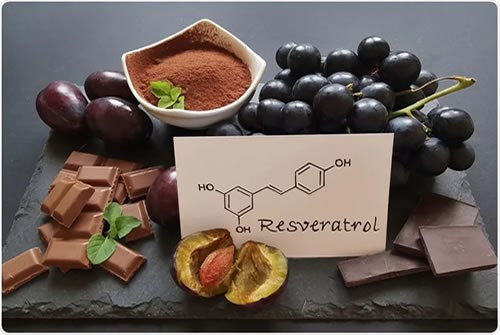Resveratrol
Posted on Apr 24th 2023

Resveratrol: Nature's Answer to Aging and Vitality
Journey with us into the realm of resveratrol, a compound capturing the intrigue of scientists, health professionals, and those on a quest for longevity. Found in the skin of grapes, certain berries, and other sources, resveratrol has drawn attention for its potential health-promoting properties. Let's delve deeper into this natural phenomenon.
Resveratrol: An Overview
Resveratrol is a type of natural phenol and a phytoalexin produced by several plants in response to injury or when under attack by pathogens. Its interest in the health community primarily stems from its presence in red wine, leading many to explore the "French Paradox" - the observation that the French population has a relatively low incidence of coronary heart disease, despite a diet high in saturated fats, potentially due to moderate red wine consumption.
Sources of Resveratrol
- Red Grapes: Especially in the skins.
- Red Wine: The fermentation process accentuates its presence.
- Blueberries, Cranberries, and Bilberries: In smaller amounts compared to grapes.
- Peanuts and Pistachios: Another noteworthy source.
- Japanese Knotweed: Used traditionally in Asian medicines.
Potential Health Benefits
Scientific research on resveratrol suggests various health benefits:
- Heart Health: Resveratrol may help reduce "bad" LDL cholesterol and prevent damage to blood vessels.
- Antioxidant Effects: It may neutralize harmful free radicals in the body.
- Anti-Aging: There's interest in its potential to extend lifespan and combat age-related diseases.
- Anti-Inflammatory: Resveratrol might suppress inflammation, a root of many chronic diseases.
- Supporting Brain Health: Some studies propose it could protect against Alzheimer's disease and cognitive decline.
Research and Considerations
While the potential benefits of resveratrol are compelling, it's essential to approach them with a balanced view:
- Dosage: The exact dose required to achieve the health benefits in humans remains uncertain. Most studies have been conducted in animals or in vitro.
- Bioavailability: Resveratrol is metabolized quickly, so its bioavailability can be low. This has led to research on resveratrol derivatives with better absorption.
- Interactions: If considering supplementation, consult with a healthcare professional, especially if on medication or pregnant.
Resveratrol in the Diet
Including resveratrol in the diet can be enjoyable:
- Moderate Wine Consumption: Red wine, in moderation, offers a source of resveratrol (but be aware of the risks of excessive alcohol consumption).
- Berries: Incorporate berries into smoothies, yogurts, or enjoy them as they are.
- Nuts: Snack on peanuts or pistachios for a dose of this beneficial compound.
Conclusion
Resveratrol stands as a beacon in the confluence of traditional wisdom and modern science, representing nature's profound ability to heal and protect. While research is ongoing, one thing is certain: the sources of resveratrol, be they berries or red wine, have delighted and nourished humans for ages.
 Loading... Please wait...
Loading... Please wait...